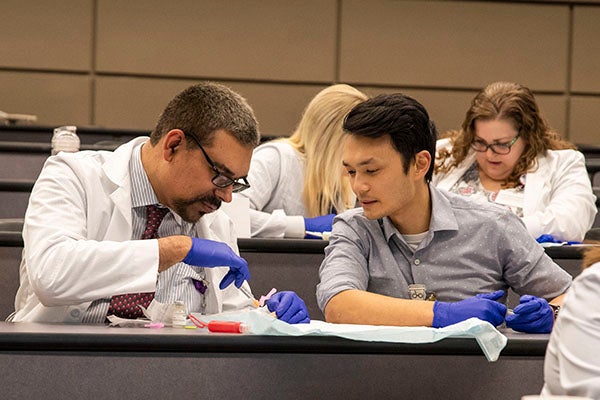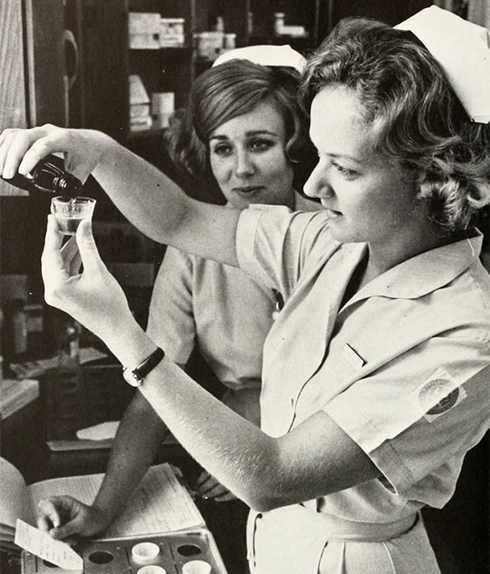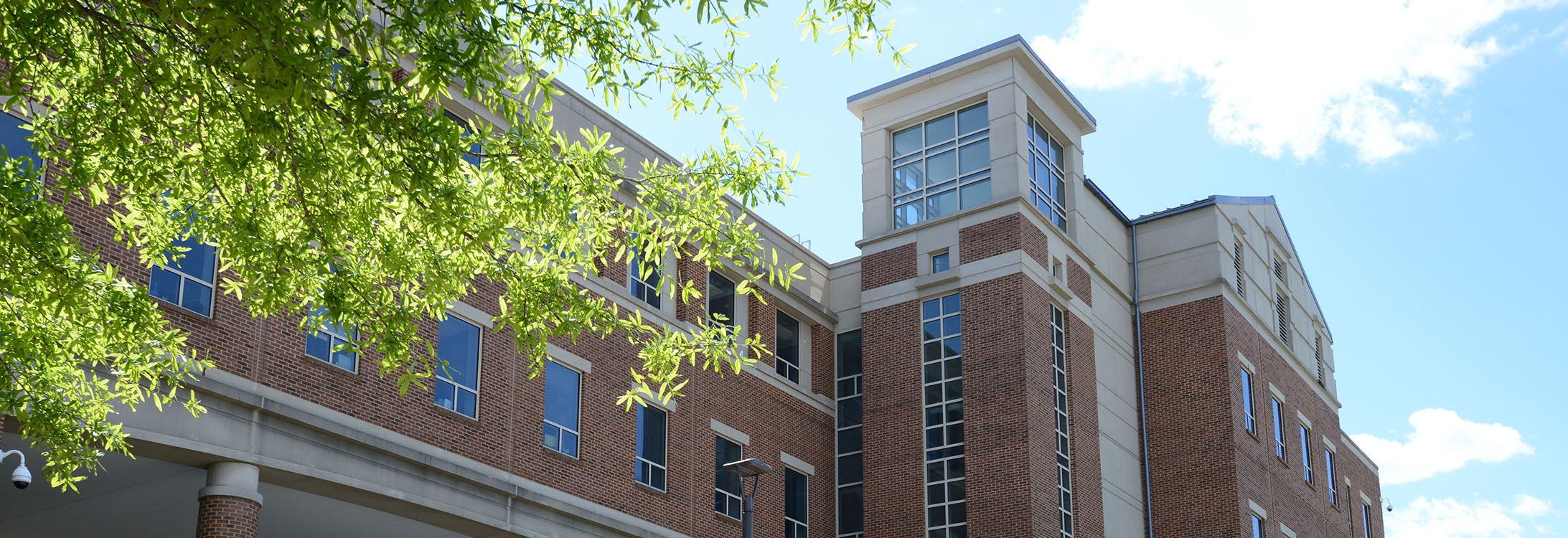60TH ANNIVERSARY
ECU College of Nursing celebrates 60 years of sustained excellence
The East Carolina College of Nursing celebrates 60 years of educating Pirate Nurses this fall. The ECU nursing community marked the occasion with a virtual Homecoming and 60th anniversary celebration that ended with a Coast-To-Coast Toast from Dean Sylvia Brown on Friday, Oct. 16.
The event capped off weeks of virtual reunions where alumni from the college reconnected with each other via Microsoft Teams and shared their favorite memories of their time at the college. The 60th anniversary celebration was initially planned to be an in-person event but was transformed into a virtual event due to the ongoing COVID-19 pandemic. The virtual event debuted on YouTube and included commentary from alumni and longtime faculty reflecting on their time at the College of Nursing.
Visit YouTube for the closed-captioned version of this video.
“Although it has been a very tumultuous year to say the least, knowing that we have so many Pirate Nurses working hard across our state and our nation and globally — this really encourages me,” said Dr. Sylvia Brown, dean of the College of Nursing since 2009, during the event. “They are working at patient bedsides, in leadership positions in health care and also studying the ways that we can improve how we care for patients, each other and ourselves. All of that gives me a great deal of hope for a brighter future.”
The four-year nursing program at what was then East Carolina College was approved in 1959, with the first class of nursing students enrolled in 1960. Since that time, the college has celebrated numerous important milestones including the addition of multiple graduate degree options, receiving countless accolades and four designations as a Center of Excellence for Nursing Education.

ECU School of Nursing students ride aboard a parade float commemorating the school’s 30th anniversary during the Homecoming parade in fall of 1990. (ECU Digital Collections photo)
Formerly the ECU School of Nursing, it joined ECU’s Division of Health Sciences in 1987 and received official designation as a college in 2007. In addition to the establishment of the school’s master’s program in 1977 and two doctoral programs — the PhD program in 2002 and the Doctor of Nursing Practice (DNP) program in 2013 — the college has grown to become the state’s largest university producer of newly-licensed nurses in the state of North Carolina.
“I’m very proud of the new programs that we’ve started, and how well they’re doing,” said Dr. Phyllis Horns, who served as dean of the school and college from 1990-2009. “They’re all quality programs and they are all well-enrolled and they’re serving a great need for our community, our state and our nation.”
“There are growth opportunities for us in the College of Nursing. I think our focus has always been on meeting the needs of the region,” Brown said. “Most recently, we added the Psychiatric Mental Health Nurse Practitioner option because we know there’s such a need for mental health providers in our area and really nationally. I hope that we will continue to focus on meeting the health care needs of rural areas and underserved areas, not only locally, but also globally.”

Since enrolling its first class in 1960, the ECU’s nursing school has grown to include several graduate degree programs including a master’s program with nine concentration options as well as two doctoral programs. (Photo taken pre-COVID-19 by Jeremy Smith)
The college’s homecoming and anniversary celebration week began with the short film premiere of “What Would Florence Say?,” a historically inspired exploration of how founder of modern nursing Florence Nightingale would counsel today’s working nurses as they care for patients during a global pandemic. The film was created by ECU Nursing faculty member Dr. Melissa Beck. Beck has played Nightingale for nursing-based educational events for nearly 10 years and collaborated with ECU Nursing PhD alumna, UNC-Wilmington faculty member and Florence Nightingale historian Dr. April Matthias, as well as Beck’s daughter, Anna Howell and others to create this historically informed short film.
“I already knew from reading her letters (how she would have written to today’s nurses),” Beck said. “I used words that she used in her letters. I had to go back and re-read a lot of her letters to find the words that I was looking for because I wanted to stay true to Florence Nightingale. I had to rely on Matthias’ expertise to sift through the things that a lot of people get wrong on the internet. I had to make sure it was true.”

Formerly housed in the Rawl Building, the Graham Building and an eight-room house on Fifth Street, the College of Nursing moved to its current home in the Health Sciences Building in 2006. The college now has 8 simulation labs equipped with the latest medical and simulation tools available, including dozens of manikins, compressed air to allow simulation of medical air, oxygen and suction, stand-up computer stations, and well as computers that operate video and sound recording and playback for debriefing in each lab space. (Photo by Conley Evans)
Alumni and friends of the college across the nation were invited to join the dean in a coast-to-coast toast that served as the finale of the virtual event. Brown raised her glass to the alumni, students, faculty staff, clinical partners, donors and friends who have helped to build the college’s legacy, and shared her vision for the future of the college.
“Let’s be reminded of our shared commitment to improve the health and well-being of people in the region and around the world through our innovation in nursing education, leadership, research, scholarship and practice,” Brown said. “As we move into our next decade, let us remember our shared vision of Pirate Nurses compelled by the belief that all people deserve quality health care, especially in rural and underserved areas.”
COLLEGE OF NURSING NEWS

A photo in The Buccaneer yearbook’s 1970 edition shows nursing students preparing medications at Wake Memorial Hospital. (ECU Digital Collections/The Buccaneer)
PIRATE NURSES TIMELINE
The East Carolina University College of Nursing grew out of humble beginnings, opening with just five instructors, a handful of students, and one office in 1959-1960.
Today, the college employs well over 150 faculty and staff members, educates more than 1,300 students each year, and is located on ECU’s expansive Health Sciences Campus.
Below are some of the milestones that highlight our history of nursing excellence.
1957
North Carolina Rep. Walter B. Jones introduces the idea of a nursing school at East Carolina College to the General Assembly.
1959
The four-year nursing program at East Carolina College receives approval.
1960
Eva W. Warren is named the first dean.
The school is housed in the Rawl Building and admits its first students in the fall.
1961
The School of Nursing moves to the Graham Building.
Uniform, insignia and cap are adopted.
1963
The School of Nursing moves to an eight-room house at 505 E. Eighth St.
1964
Seventeen students comprise the first graduating class.
The Pin is designed.
In December, the school is accredited by the National League for Nursing.
1966
The registered nurse to bachelor’s of science in nursing (RN to BSN) program is affirmed by the NLN.
1967
The East Carolina College becomes East Carolina University.
The School of Nursing moves into new building at the east end of campus, along Fifth Street.
1969
Dean Warren retires. Evelyn Perry becomes dean.
1974
Beta Nu Chapter of Sigma Theta Tau, the international honor society of nursing, is chartered.
1977
Master of Science in Nursing (MSN) program is established.
1982
Emilie Henning is appointed dean following Dean Perry’s retirement in 1981.
1987
College of Nursing becomes part of the Division of Health Sciences. The division comprises the the College of Allied Health Sciences, Brody School of Medicine, Laupus Health Sciences Library and School of Dental Medicine.
1990
Phyllis N. Horns (BSN ’69) becomes dean after Emilie Henning’s resignation.
2002
Doctor of Philosophy (PHD) in Nursing program is established.
2006
The school moves to the Health Sciences Campus in the Health Sciences Building, along with College of Allied Health and Laupus Library.
2007
The ECU School of Nursing officially becomes ECU College of Nursing.
The first endowed professorship, the Richard R. Eakin Professorship, is established through support of the C.D. Spangler Foundation.
2008
The College of Nursing is recognized as NLN Center of Excellence in Nursing Education. (The college later earns this status again for 2020-25).
2009
Sylvia T. Brown (BSN ’75, MSN ’78) assumes the role as dean of the College of Nursing as Phyllis Horns becomes Vice Chancellor for Health Sciences.
Eastern Regionally Increasing Baccalaureate Nurses (RIBN) option is established, which dually enrolls students in community colleges and ECU.
2010
The College of Nursing celebrates the 50th anniversary of its founding with the launch of the Hall of Fame program to recognize nursing leaders.
The College of Nursing BSN and MSN programs are accredited by the Commission on Collegiate Nursing Education.
The Student Leadership Council is established.
2012
The Early Assurance Program is established in collaboration with the Honors College.
The Future Pirate Nurse Learning Village, a living and learning environment for intended nursing majors, begins.
2013
The first Pirate Nurse Network alumni group is launched.
The Doctor of Nursing Practice (DNP) program is established.
2014
The accelerated second-degree BSN program is created.
The BSN to PhD and DNP to PhD options are initiated.
2015
The first Massive Open Online Course (MOOC) is offered.
2016
A Research Hub is established in collaboration with the College of Allied Health Sciences.
2018
The College of Nursing Simulation Labs receive provisional accreditation.
2020
First Early Assurance students enter the PhD program upon completion of the BSN.
